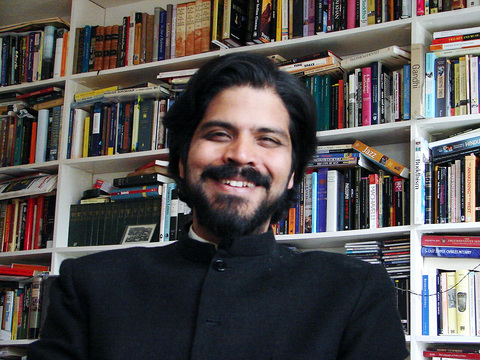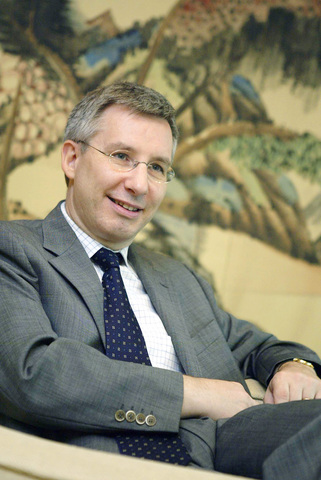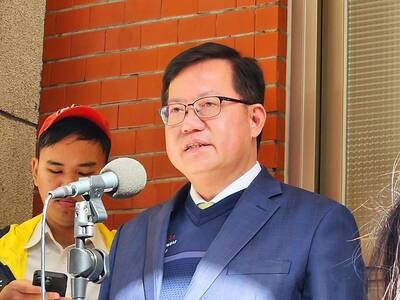Lung Ying-tai (龍應台) is disillusioned with Taiwan's political scene. Fed up with the constant partisan bickering and lunch-box battles in the legislature, the founder and president of the Lung Ying-tai Cultural Foundation (龍應台文化基金會) — a non-governmental organization (NGO) based in Taipei — hopes to provide an antidote to Taiwan's political chaos through hosting a series of lectures called Taipei Salon (台北沙龍). The lectures are conducted in English.
Begun last year, Lung's idea combines the French institution of literary salons with modern ideas on how to create a civil society — where an informed citizenry is empowered to make intelligent voting decisions, participate in politics and hold government and industry to account.
"[We] want to have an impact on society through intellectual discussion ... away from [the] narrow path of political fighting or reform," Lung said in an interview.

Creating a civil society is something that Lung knows a lot about. Appointed Taipei City's first cultural csar in 1999, during her four-year term she designed and implemented a cultural policy that increased the visibility of the arts in the city. With 15 book titles to her name, the current chair of arts and humanities at Tsing Hua University frequently publishes critical essays in European magazines and newspapers on both sides of the Taiwan Strait.
This month's lectures begin tomorrow with Jean-Claude Poimboeuf, Director of French Institute in Taipei, who will discuss how the French maintain their unique cultural identity in the age of globalization.
On March 17, Pankaj Mishra, a novelist and contributor to the New York Times, will talk about India's path to democracy. This month's series will end on March 24 with Julian Nida-Ruemelin — professor of political theory and philosophy at the University of Munich and a former minister of culture — who will discuss the relationship between globalization and democracy.

PHOTOS COURTESY OF LUNG yINGTAI CULTURAL FOUNDATION
Past speakers include David Plott, the former editor-in-chief of The Far Eastern Economic Review and current professor of journalism at the University of Hong Kong, and Jurgen Gerbig, Director of the German Cultural Center in Taipei.
By conducting the lectures in English, Lung hopes that foreigners will attend the lectures and participate in the discussions.
"I suspect [expats] have been closed up — because of the language barrier — in their own circles, which is not fair because they are citizens of the city," she said. "But so far we have not been able to reach the expat community because we don't know where they are."
Though foreigners are invited to participate, the youth of Taiwan are the real focus of Lung's salon.
"We want to get in touch with the younger generation," she said. "We are disappointed with anyone over 40 — so we decided to carry on a dialogue with people under 40," she added jokingly.
"We want to … cultivate the minds of the younger generation so that they are open-minded ... are concerned about global issues [and] ... have compassion for the weaker, whether in terms of income, resources, or in environmental areas — global citizenship in other words.
Though a tall order, Lung has found remarkable success with Taipei Salon. The last two lectures saw the auditorium at Yuehan Hall (月涵堂) packed to capacity with everyone from high school students to young professionals.
In addition to Taipei Salon, Lung's foundation has also set up a Thinkers Salon (思沙龍), a club with seminars conducted in Chinese that exposes participants to different cultures throughout the world. Under the title "What you do not know" (你所不知道的), it has covered topics such as Latin America, North and South Korea and the conflicts between the Israelis and Palestinians.
By doing so, Lung believes the youth of Taiwan will come to see they have the power to create an efficient civil society, thus furthering the island's democratization.
"We have to … focus on the younger generation and that kind of idea leads us to do what we are doing now," she said.

Last week, Viola Zhou published a marvelous deep dive into the culture clash between Taiwanese boss mentality and American labor practices at the Taiwan Semiconductor (TSMC) plant in Arizona in Rest of World. “The American engineers complained of rigid, counterproductive hierarchies at the company,” while the Taiwanese said American workers aren’t dedicated. The article is a delight, but what it is depicting is the clash between a work culture that offers employee autonomy and at least nods at work-life balance, and one that runs on hierarchical discipline enforced by chickenshit. And it runs on chickenshit because chickenshit is a cultural

My previous column Donovan’s Deep Dives: The powerful political force that vanished from the English press on April 23 began with three paragraphs of what would be to most English-language readers today incomprehensible gibberish, but are very typical descriptions of Democratic Progressive Party (DPP) internal politics in the local Chinese-language press. After a quiet period in the early 2010s, the English press stopped writing about the DPP factions, the factions changed and eventually local English-language journalists could not reintroduce the subject without a long explanation on the context that would not fit easily in a typical news article. That previous

By far the most jarring of the new appointments for the incoming administration is that of Tseng Wen-tsan (鄭文燦) to head the Straits Exchange Foundation (SEF). That is a huge demotion for one of the most powerful figures in the Democratic Progressive Party (DPP). Tseng has one of the most impressive resumes in the party. He was very active during the Wild Lily Movement and his generation is now the one taking power. He has served in many of the requisite government, party and elected positions to build out a solid political profile. Elected as mayor of Taoyuan as part of the

April 29 to May 5 One month before the Taipei-Keelung New Road (北基新路) was set to open, the news that US general Douglas MacArthur had died, reached Taiwan. The military leader saw Taiwan as an “unsinkable aircraft carrier” that was of huge strategic value to the US. He’d been a proponent of keeping it out of Chinese Communist Party (CCP) hands. Coupled with the fact that the US had funded more than 50 percent of the road’s construction costs, the authorities at the last minute renamed it the MacArthur Thruway (麥帥公路) for his “great contributions to the free world and deep